Understanding the Emotional Landscape of Recovery
Early sobriety is a critical and often tumultuous period marked by intense emotional fluctuations, including heightened negative affect, stress, and physiological changes. Recognizing these emotional challenges as normal and inevitable part of the recovery journey can empower individuals to develop effective regulation strategies. Mastering emotional regulation not only supports immediate sobriety but also lays the foundation for long-term resilience and mental well-being.
The Role of Emotional Regulation in Recovery Success
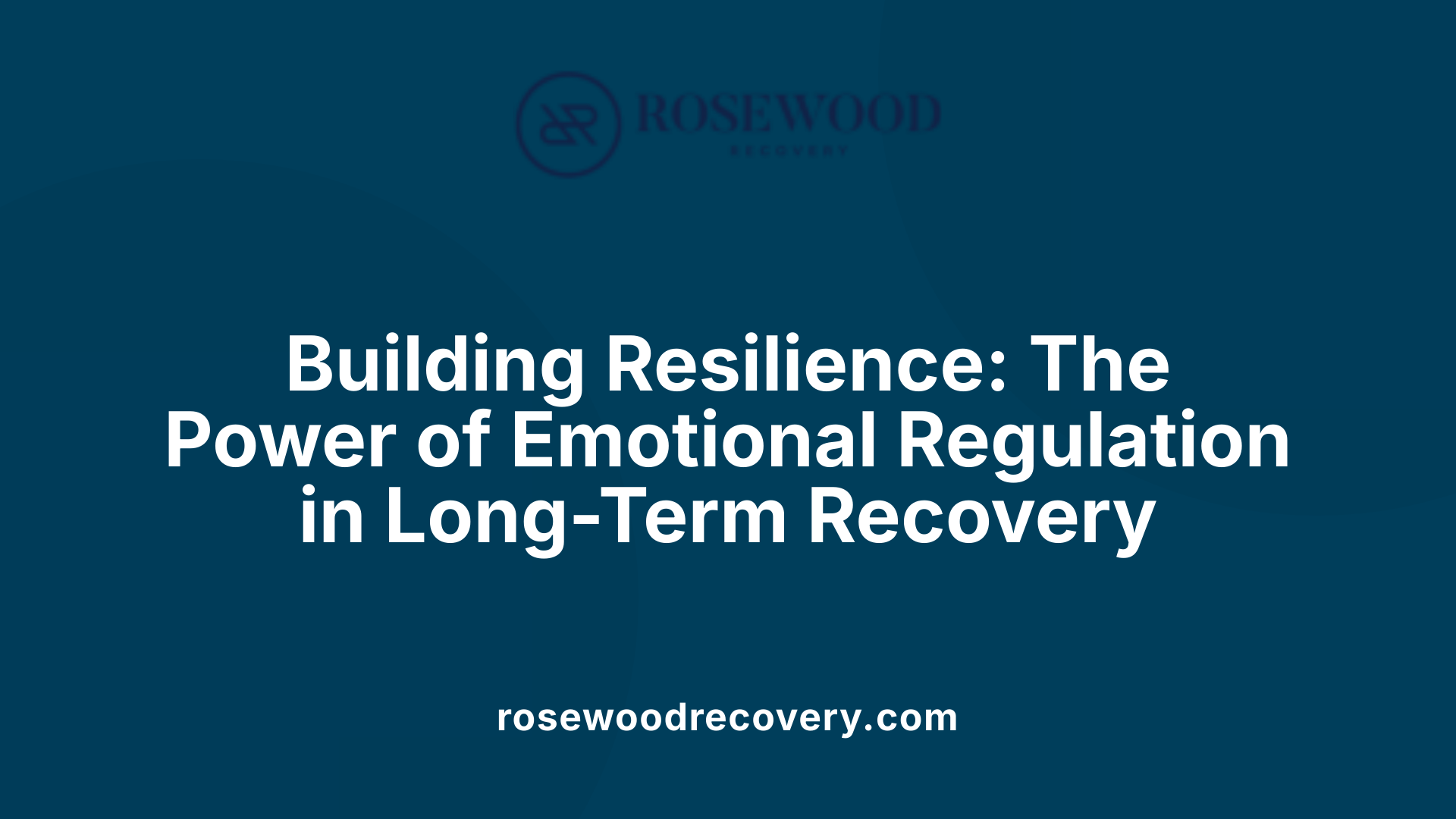
What is the role of emotional regulation in early sobriety?
During early recovery from alcohol use disorder (AUD), emotional regulation becomes a vital part of maintaining sobriety. Individuals often experience intense feelings such as stress, anxiety, depression, anger, and loneliness. These emotions are normal but can be overwhelming and difficult to handle.
Impaired emotional regulation can increase the risk of relapse. For example, heightened negative affect and stress tend to decrease a person's ability to differentiate between discrete emotions, making it harder to respond appropriately. Relying on maladaptive methods like suppression or avoidance can lead to impulsive decisions, including relapsing into substance use.
To foster stability, recovery programs teach skills like mindfulness, deep breathing, and cognitive reframing. Techniques derived from dialectical behavior therapy (DBT) and cognitive-behavioral therapy (CBT) help individuals recognize their emotions, tolerate discomfort, and avoid acting impulsively. Developing emotional awareness through self-check-ins or journaling offers insight into emotional patterns and triggers.
Building emotional regulation skills also involves understanding the importance of self-care, social support, and managing co-occurring mental health conditions such as depression and anxiety. When individuals can manage their emotional responses effectively, they not only improve their psychological resilience but also reduce the likelihood of emotional triggers leading to relapse.
In sum, fostering strong emotional regulation during early sobriety supports psychological well-being and creates a foundation for long-term recovery success. It allows individuals to navigate emotional highs and lows without resorting to substances, promoting stability, and growth on the recovery journey.
Techniques to Manage Intense Emotions
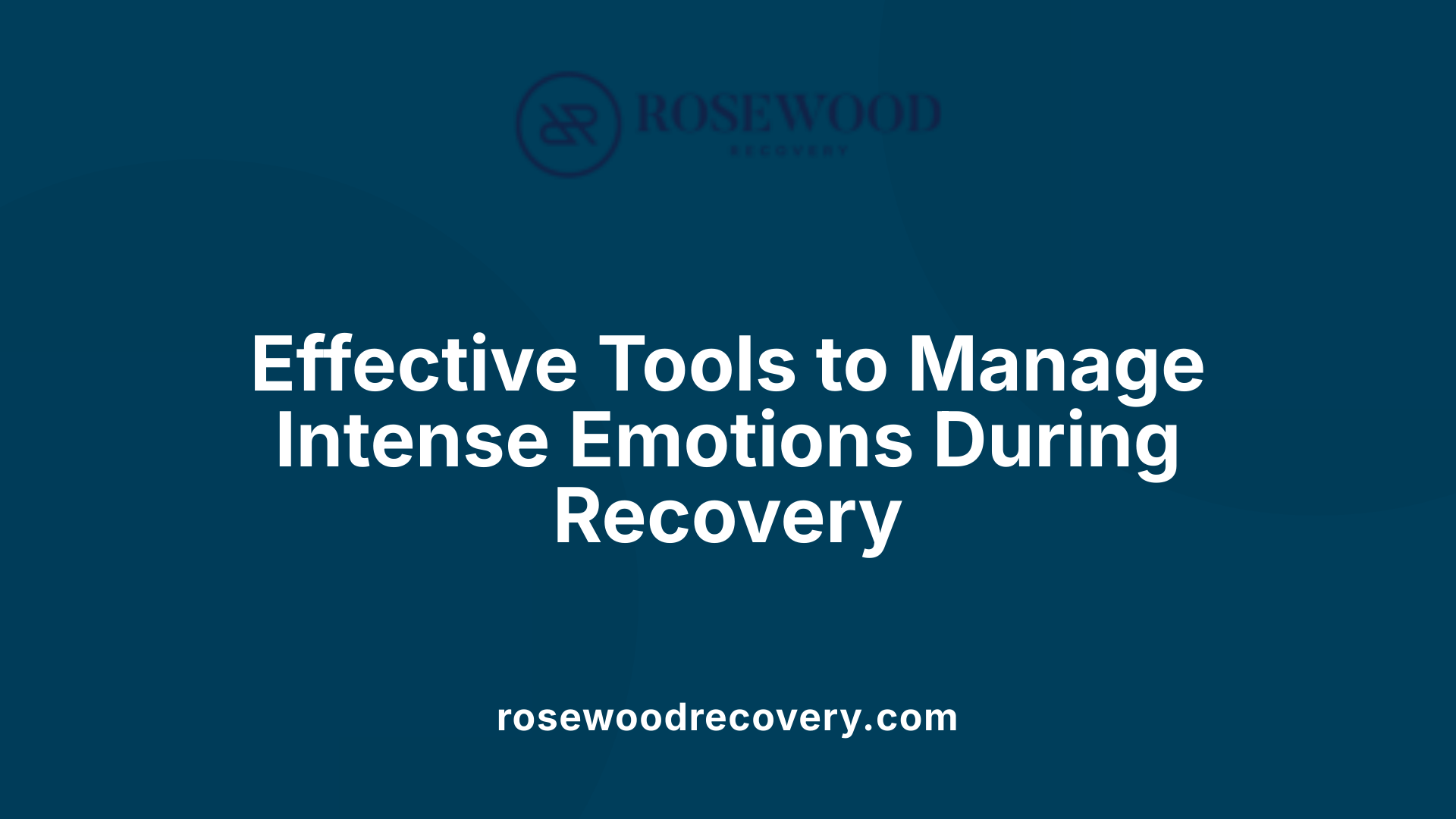
What techniques can help manage intense emotional states during early recovery?
Managing strong feelings is a vital part of maintaining sobriety during early addiction recovery. Several techniques are effective in helping individuals cope with intense emotions such as anger, sadness, and anxiety.
One of the most accessible methods is practicing mindfulness and meditation. These practices encourage present-moment awareness, allowing individuals to observe their emotions without judgment. This awareness can reduce impulsive reactions to emotional surges.
Deep breathing exercises, like the 4-7-8 technique, activate the body's relaxation response, calming the nervous system and decreasing physical symptoms of stress. Progressive muscle relaxation involves tensing and releasing muscle groups to alleviate physical tension linked to emotional distress.
Grounding techniques serve as quick tools to reconnect with the present. Using sensory inputs—like feeling textures or listening to sounds—helps individuals break free from overwhelming emotional cycles.
Journaling is another powerful technique. Writing about emotions helps process feelings, clarify their root causes, and identify recurring patterns that may trigger relapse.
Cognitive reframing challenges negative thoughts, replacing them with more balanced perspectives to lessen emotional intensity and promote resilience.
Distracting oneself with activities like walking, hobbies, or engaging in creative endeavors such as expressive arts therapy can redirect focus from distressing emotions, fostering emotional stability.
Seeking support from therapists, peer groups, or sponsors enhances emotional resilience. Talking through feelings and receiving validation reinforce coping skills.
Developing self-awareness, setting boundaries, and practicing self-compassion are fundamental for emotional regulation. These practices help individuals recognize when emotions are mounting and respond adaptively.
Incorporating these techniques into daily routines can significantly improve emotional management, reduce the risk of relapse, and support long-term sobriety during the vulnerable early recovery phase.
Addressing Co-occurring Emotional Disorders
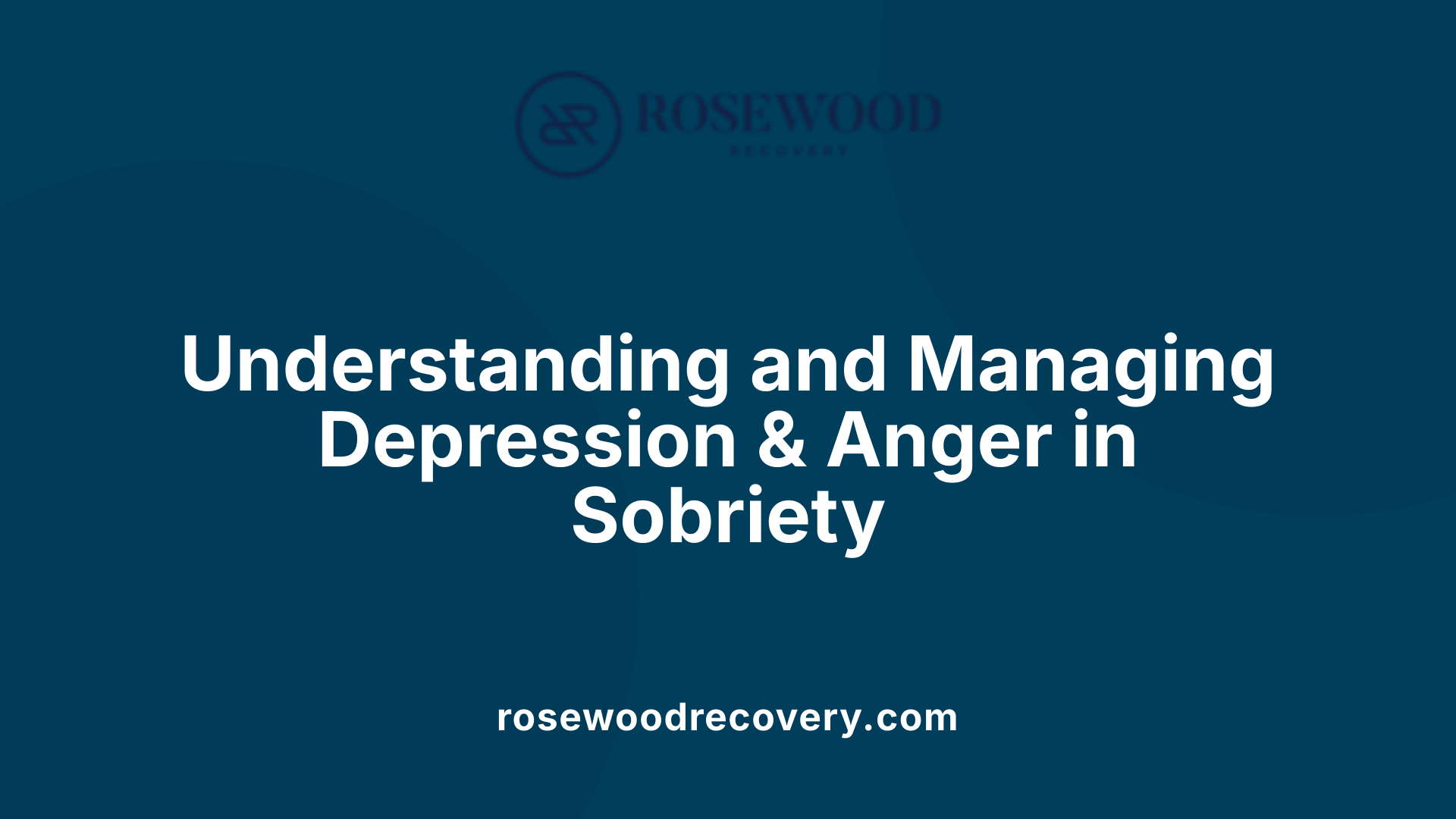
How can emotional disturbances such as depression and anger be addressed during recovery?
Managing emotional issues like depression and anger is vital for long-term sobriety. These disturbances often coexist with addiction and can undermine recovery efforts if not properly addressed.
In recovery, a comprehensive approach that combines therapy, medication if needed, and the development of healthy coping skills is most effective. Therapies such as cognitive-behavioral therapy (CBT) help individuals identify and challenge negative thoughts that fuel depression and anger. Dialectical behavior therapy (DBT) is especially useful for managing intense emotions, teaching skills like emotional regulation, distress tolerance, and mindfulness.
In addition to therapy, relaxation techniques such as deep breathing, progressive muscle relaxation, and mindfulness meditation can reduce emotional volatility. Anger management training, often integrated into treatment plans, equips individuals with skills to express feelings constructively and prevent impulsive reactions.
Support groups and peer networks provide emotional validation and a sense of community, which are critical in overcoming feelings of loneliness and shame. Tailored treatment plans that address specific emotional challenges—including trauma-informed care for underlying issues—further enhance recovery.
Ultimately, proactively addressing depression and anger helps maintain emotional stability, boosts resilience against relapse triggers, and supports sustained sobriety. Regular mental health assessments and ongoing emotional skill development are essential components of successful addiction recovery programs.
Common Emotional Challenges in Early Sobriety and Coping Strategies
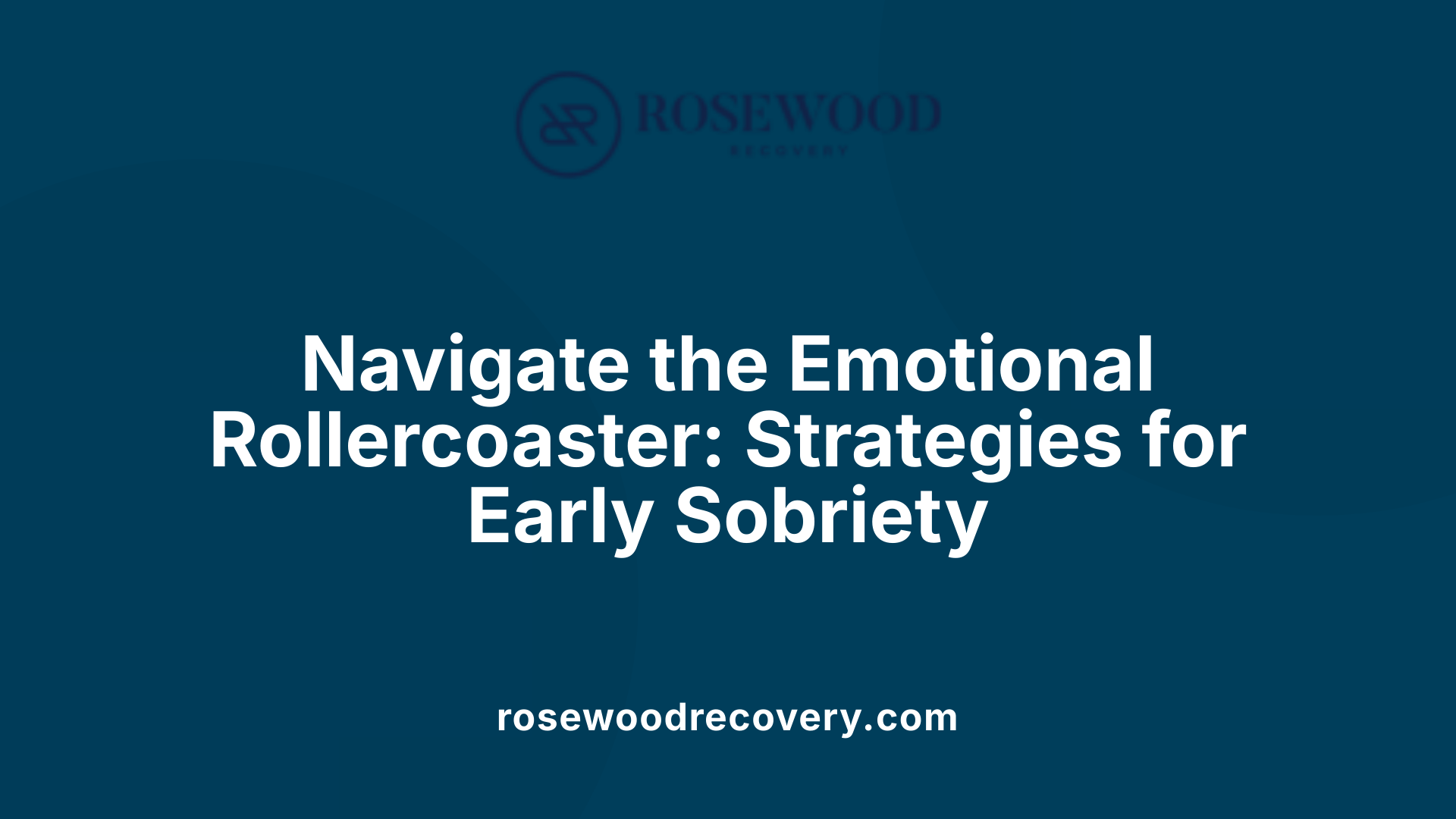
What are common emotional challenges faced in early sobriety and how can they be coped with?
During the initial phase of recovery from alcohol or drug use, individuals often experience a whirlwind of emotions. It is common to face feelings of depression, anxiety, frustration, and fear. These intense emotions can be overwhelming as the brain chemistry adjusts and old coping mechanisms are replaced with healthier strategies.
Depression in early sobriety may manifest as persistent sadness, loss of interest in activities, or feelings of hopelessness. Anxiety can present as heightened nervousness, restlessness, or physical symptoms like increased heartbeat. Frustration might emerge from the struggle to manage cravings or emotional upheavals, while fear often relates to facing an uncertain future or fear of failure.
Coping with these emotional challenges involves multiple approaches. Engaging in therapy, such as cognitive-behavioral therapy (CBT), helps individuals recognize and challenge negative thought patterns. Mindfulness practices foster present-moment awareness, aiding in emotional regulation and reducing feelings of overwhelm.
Building a strong support network is vital. Support groups, family, and friends provide emotional backing, understanding, and accountability. Sharing feelings and experiences reduces loneliness and validates the recovery journey.
Developing healthy routines is also crucial. Regular exercise, balanced nutrition, adequate sleep, and engaging in hobbies contribute to emotional stability. Stress reduction techniques like deep breathing, relaxation exercises, and expressive arts give additional tools to manage difficult emotions.
Overall, managing emotional challenges in early sobriety requires a holistic approach. Combining professional support, social connections, healthy habits, and stress management strategies fosters resilience and promotes long-term sobriety.
Educational Insights on Emotional Differentiation and Regulation
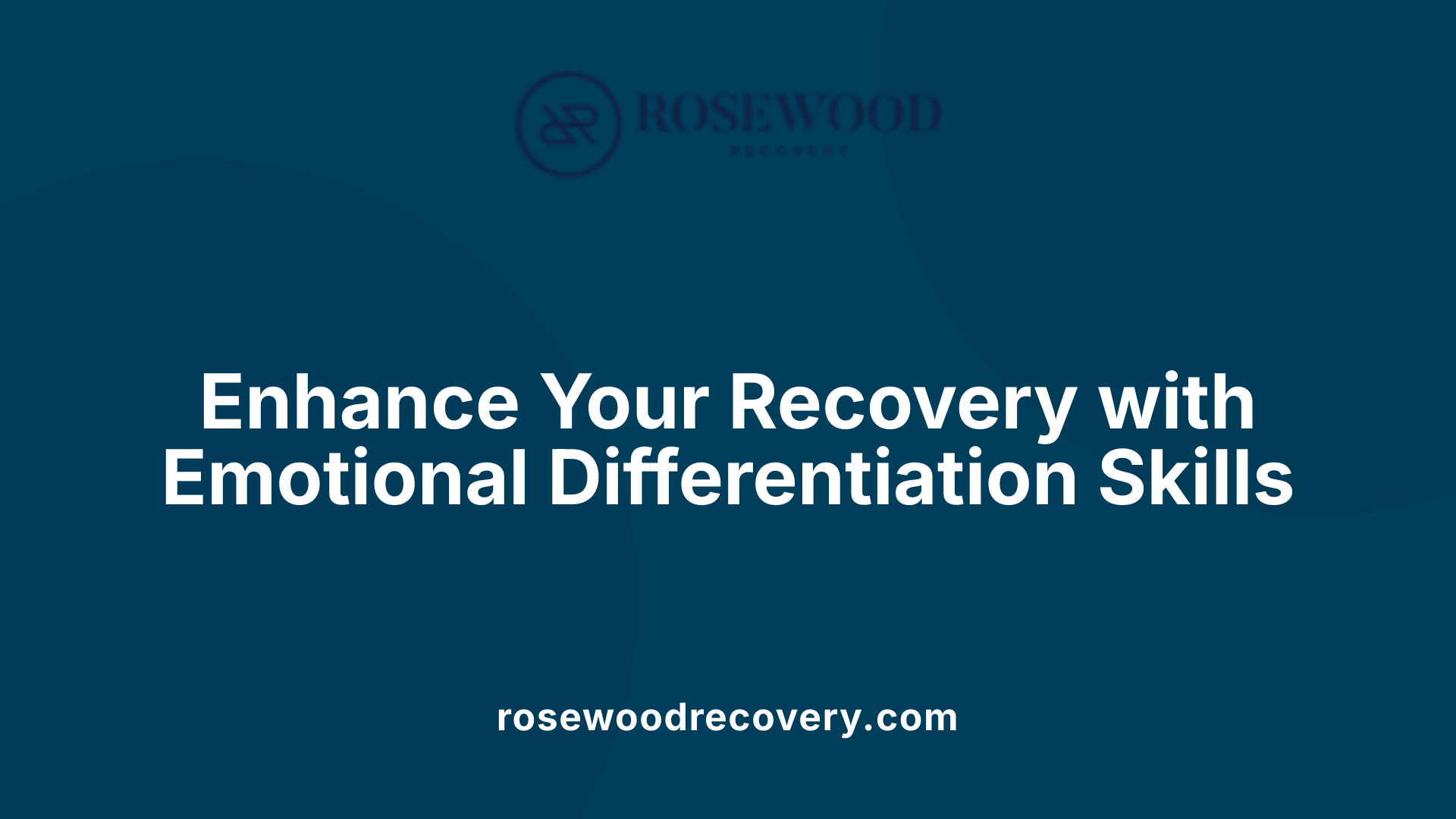 Understanding the importance of emotional awareness is crucial in managing recovery from alcohol use disorder (AUD). Developing the ability to differentiate between specific emotions helps individuals respond more adaptively to various situations. This skill, known as emotion differentiation, allows for more precise emotional regulation, which is especially important during early recovery when intense feelings such as anger, shame, and loneliness are common.
Understanding the importance of emotional awareness is crucial in managing recovery from alcohol use disorder (AUD). Developing the ability to differentiate between specific emotions helps individuals respond more adaptively to various situations. This skill, known as emotion differentiation, allows for more precise emotional regulation, which is especially important during early recovery when intense feelings such as anger, shame, and loneliness are common.
Educational strategies focus on teaching individuals to label and understand their feelings accurately. This process promotes healthier reactions and reduces impulsive behaviors linked to emotional dysregulation. Techniques like mindfulness, cognitive reappraisal, and acceptance form the foundation of effective emotion regulation. Mindfulness practices help individuals become present with their feelings without judgment, while cognitive reappraisal encourages reinterpreting negative thoughts to lessen emotional impact. Acceptance involves acknowledging emotions without avoidance or suppression, which is vital for emotional processing.
To enhance emotional learning, educators often incorporate visual aids like emotion wheels or charts that help identify different feelings. Role-playing exercises simulate real-life scenarios, giving learners opportunities to practice managing their emotional responses. Reflection activities, such as journaling, support deeper understanding of emotional patterns and triggers.
Managing triggers and physical symptoms associated with intense emotions is also essential. Recognizing physical signs of stress, such as tense muscles or rapid heartbeat, can prompt timely application of regulation techniques. For instance, deep breathing exercises like the 4-7-8 method activate relaxation responses, calming the nervous system.
Overall, explicitly teaching emotional differentiation and regulation skills builds emotional intelligence, which aids in stress management, improves social interactions, and supports sustained recovery. A comprehensive educational approach ensures that individuals can navigate emotional challenges effectively, promoting long-term mental and emotional well-being.
Long-Term Benefits of Emotional Regulation in Sobriety
Why is emotional regulation important for long-term recovery success?
Emotional regulation plays a vital role in achieving lasting sobriety. When individuals learn to manage stress, negative feelings, and emotional triggers, they are better equipped to resist the urge to relapse. Techniques like mindfulness, cognitive-behavioral therapy (CBT), dialectical behavior therapy (DBT), and expressive arts therapy are instrumental in helping people develop awareness of their emotions and learn healthy ways to respond.
During early recovery, intense feelings such as anger, shame, and loneliness are common. Without proper tools, these emotions can overshadow progress and lead to impulsive behaviors, like drinking or using drugs again. Strong emotional regulation skills foster resilience, allowing individuals to handle setbacks calmly and effectively.
Reducing symptoms of mental health issues, including anxiety and depression—which frequently occur alongside addiction—further stabilizes recovery. When people understand their emotional patterns and develop strategies to cope, they experience fewer destructive impulses, better relationships, and improved mental well-being.
Building emotional resilience doesn't just support sobriety; it enhances overall life stability. This process involves ongoing self-awareness, patience, and practice, creating a foundation for long-term health and happiness. This holistic approach emphasizes that managing emotions is not just a recovery step but a lifelong skill for maintaining personal growth and emotional balance.
Therapeutic Resources for Emotional Regulation
During early recovery from alcohol use disorder (AUD), managing intense emotions such as anger, fear, guilt, and loneliness is vital for maintaining sobriety. Various therapeutic approaches and resources are available to help individuals develop emotional regulation skills. Cognitive-behavioral therapy (CBT) and dialectical behavior therapy (DBT) are widely used to identify and challenge negative thought patterns and teach coping strategies for managing heightened emotions. Emotion-focused therapy (EFT) assists clients in recognizing and processing their feelings, leading to emotional clarity and resilience. Expressive arts therapy—using creative outlets like painting, writing, or music—provides an alternative means to express and process feelings in a non-verbal, healing manner.
Practical techniques such as mindfulness and meditation foster present-moment awareness, helping individuals observe their emotional states without judgment. Grounding exercises, which use sensory input to reconnect with the here and now, are especially effective in moments of crisis. Deep breathing exercises, like the 4-7-8 technique, activate the parasympathetic nervous system, calming anxiety and reducing emotional overload.
Support resources from agencies such as SAMHSA (Substance Abuse and Mental Health Services Administration) include crisis helplines, educational campaigns, and tools for mental health awareness. Joining support groups—whether peer-led or professional—provides community and accountability, reinforcing emotional stability.
Engaging in hobbies, journaling to clarify feelings, or using distraction techniques can also serve as effective coping mechanisms. Developing these skills diminishes the risk of relapse by enabling individuals to maintain emotional balance through the ups and downs of recovery.
In sum, a combination of therapy, mindfulness practices, and external support forms a comprehensive approach to emotional regulation during early sobriety, supporting long-term recovery and emotional well-being.
Embracing Emotional Balance for Sustained Sobriety
Mastering emotional regulation is a cornerstone of effective early recovery. By adopting techniques such as mindfulness, journaling, cognitive reframing, and engaging in therapeutic approaches like CBT and DBT, individuals can better understand and manage their emotional responses. Addressing co-occurring disorders and cultivating a support network further strengthen resilience, helping to prevent relapse triggered by emotional upheavals. Building emotional sobriety through continuous learning, self-awareness, and healthy lifestyle habits fosters long-term stability and well-being. Embracing emotional balance not only facilitates recovery but also promotes a fulfilling, thriving life beyond substance dependence.
References
- Emotion differentiation in early recovery from alcohol use ...
- Navigating New Emotional States in Recovery
- The Role of Emotions in Recovery and Treatment
- 7 Common Emotions During Sobriety and How to Cope ...
- 7 Tips to Improve Your Emotional Regulation in Recovery
- Emotional Regulation in Addiction Treatment at Antrim, NH
- Managing Emotions in Recovery
- Emotional Regulation in Recovery: Its Importance and How ...
- Emotional Sobriety in Recovery
- Home | SAMHSA - Substance Abuse and Mental Health ...




